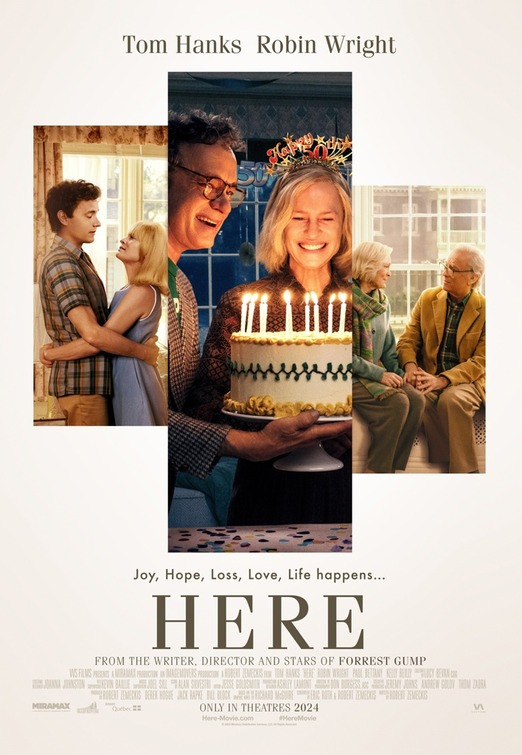
Last night, I struggled to sleep, anxious to know the long-awaited result, so I got up early this morning and confirmed that Americans are indeed fools: the new Zemeckis film is excellent.
From the announcement of this improbable project—a film adaptation of Richard McGuire's already extraordinary and unconventional graphic novel—the material seemed tailor-made for the director, who has always been fascinated by the passage of time, an unstoppable force that his characters, despite their efforts, can never truly escape, no matter how extraordinary the events. Whether it's time travel, drinking an elixir of immortality, building a raft, or investigating a possibly spy wife, time always catches up. Only one thing transcends space and time, and anyone who remembers what Christopher Nolan had Anne Hathaway say in *Interstellar*, in response to masculine rational logic, already knows the answer (brace for sentimentality): it’s love. And that is one of the central ideas of Robert Zemeckis’ cinema.
It’s no coincidence that the director chose to reunite the couple (and the team) from *Forrest Gump*, his great love story, for this new exploration of love tested by time. But what Zemeckis and co-writer Eric Roth deliver here is the anti-*Forrest Gump*, once again recounting the story of America—even going back to the dinosaurs this time!—but without leaving the confines of a simple room and its purposefully mundane routine. The stunning silent introduction that sets the tone and the film's narrative and visual structure, featuring multiple “windows” into different temporal moments along the same axis, includes the only “spectacular” scene, set in prehistory. Everything else, even scenes referencing one of only two wars fought on American soil, is eclipsed in favor of a deliberate banality that forms the project’s core.
By focusing on a simple living room in a house—a common place in every sense of the word—Zemeckis allows history to repeat itself, as he enjoys doing (cf. deliberate echoes throughout the *Back to the Future* trilogy, Forrest’s journey, in the life of Beowulf, etc.), to better reach the universality of human experience (though I do regret the lack of non-heteronormative experiences), grounded in memory, the recollection of moments that are sometimes trivial but more often than not, more than that. Because it’s often the small things in everyday life that stick with us, that transcend time, making past and present coexist.
Thus, this formal choice allows for juxtapositions that are sometimes playful, sometimes moving, and occasionally breathtaking, in an incredible fusion of arts that sits between theater and contemporary art installations. The viewer’s eye is constantly drawn to explore the frame(s), the depth of field (with the few rare exceptions being brilliant), to grasp the entirety of life that is, was, and will be happening before our eyes, this relentless passage of time that destroys, raises, creates, ages, and kills. Notably, this evolutionary timeline avoids artificially dwelling on technological progress to indulge in easy nostalgia. The large radio gives way to various televisions, car models seen through the window change regularly, and one timeline hints at the dawn of aviation. Yet Zemeckis, curiously, spotlights a decidedly unremarkable invention—a reclining chair—as symbolic of a fitting sedentism. This too is a conscious refusal to focus on what truly moves society...perhaps precisely because things don’t really change?
If there’s a hint of politics in this portrayal, it emanates from details, seemingly insignificant but sometimes loaded with meaning, like the social status of the only character who dies of COVID, or a father’s advice to his Black son, as tragically ordinary as the other life snippets. And what to make of that line from a soldier told that America has gained independence (“Now what?”). After all, that was already Forrest Gump’s trajectory, traversing America’s historical milestones but changing nothing, continuing to wonder about his “destiny.” Here, the protagonist played by Tom Hanks can’t even escape his father’s fate, becoming his mirror image, just as Marty McFly feared.
The only joy, the only constant, is, as in *Allied*, where the couple made love in an isolated car in the middle of the desert, shielded by a metaphorical sandstorm as meaningful as the bombing during which they would later welcome their daughter’s birth, love. That is what Zemeckis is telling us.
Time passes, history repeats itself, and humanity can only love. Curtain falls.
I cried.